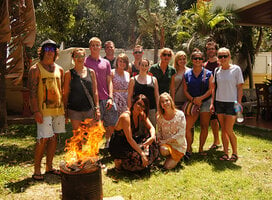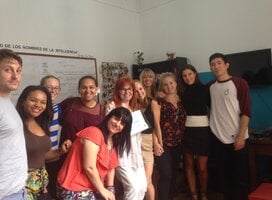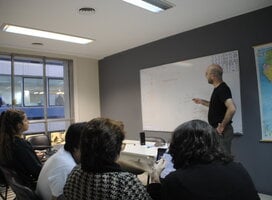Teach English in Buenos Aires, Argentina
Buenos Aires is a sensory city, with its intoxicating smells and tastes as you pass by a panaderia selling buttery sweet medialunas or the many parillas grilling up sizzling steaks on the asado. Meandering through the stalls of San Telmo’s Sunday market in Plaza Dorrego, it’s hard to miss the sultry sights and sounds of a couple dancing tango. Buenos Aires has lured many expats to spend time in this South American gem, and many of them make their living by teaching English.
While you might hear differing viewpoints about the stability of the government and the economy in Buenos Aires, one thing that is for sure is more and more people are learning English. It is becoming more common for children to attend bilingual schools, where they practice English for at least two hours a week.
Also, business professionals are interested in learning English, either for work or travel to English speaking countries. Most often the work is freelance and your schedule is different each day, but if you like talking to a variety of people and getting to know a city like a local, Buenos Aires is the right city for you!
Language Institutes:
The most common type of teaching job is working at a variety of institutes. Many teachers work for two or three, which means dropping off time sheets and picking up paychecks at three different places (and can get confusing). This type of work involves a lot of travel from each student’s office or home, but the classes are mainly conversation based.
Public and Private Schools:
Some English teachers might find a job working at a primary or secondary school in Buenos Aires, which is less common and competitive, but many of these schools will help sponsor a work visa and set you up with a bank account. The pay is sometimes lower, but you are guaranteed block hours of work and there are additional benefits such as vacation days, transportation and insurance.
Private Lessons:
Giving private classes is another option that brings in more money. As a private teacher, you decide your salary, but you also need your own material. Find students through word of mouth or with the help of online classifieds advertisements.
When and Where to Look for Jobs:
You can search for and get in contact with institutes about available teaching positions in your native country, but (almost) no institute will consider you until you step on Argentine soil. Once you arrive in Argentina, post your advertisement online, on sites such as the Bueno Aires Expatriates Group, and peruse for job vacancies. Blindly emailing institutes also has very good results!
Qualifications:
Getting TEFL certified and having a Bachelor’s Degree is definitely a plus, but not required. Many institutes are pleasantly surprised when potential employees go through TEFL training.
Salary & Cost of Living:
Whether or not it’s honestly portrayed, inflation is constantly on the rise in Buenos Aires, which means every couple of months you will get a raise, but your rent will also go up! Working with institutes, you will make around AR $50-60 an hour. If you give private classes you can usually charge about AR $70-100.
Currently, you can find a decent room in a shared house for about AR $2,000 (~ $387 USD)/month. After you assemble the perfect schedule with about 15-20 hours of actual work, you can earn about AR $3,300-4,400 ($638-851 USD)/month, meaning you have about AR $1,300-2,400 ($251-464 USD) left over for groceries and entertainment. Quick, cheap food is about AR $15-30 and an average dinner with wine is about AR $100-150.
The most popular places for foreigners to live in Buenos Aires are Palermo and Recoleta. Recoleta has a posh, European feeling to it and Palermo SoHo and Palermo Hollywood (two sub neighborhoods of the larger Palermo) are popular for shopping and dining. Most foreigners avoid going to La Boca and it’s surrounding neighborhoods after dark.
Classroom & Work Culture:
Most students are business professionals, so your classes will either be held at the student’s office or home. This means that you should wear professional dress, but lean towards casual. Much of your day will be spent traveling from one student’s home/office to another, so make sure you’re comfortable. Also, be sure you have enough time between classes to catch the subway or a bus.
Usually your classes will be more conversation based and less focused on grammar, so classes tend to be one on one and fairly casual. Don’t be surprised when you get a kiss on the cheek from a complete stranger, a beso is how everyone is greeted in Buenos Aires!















